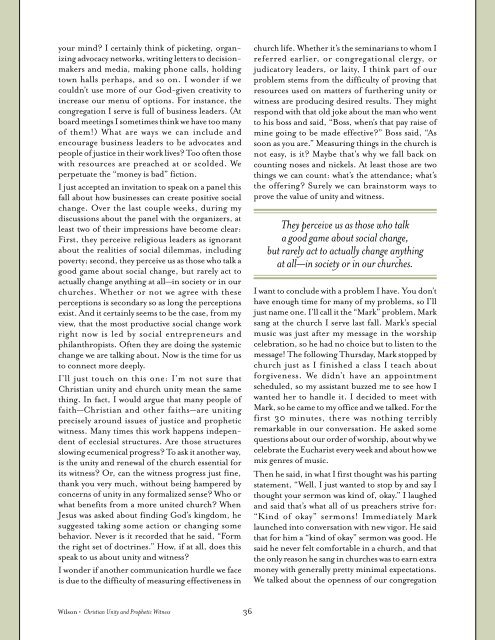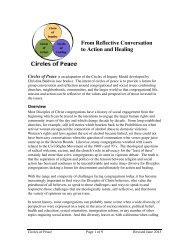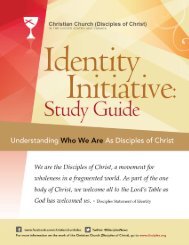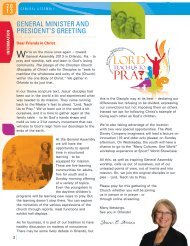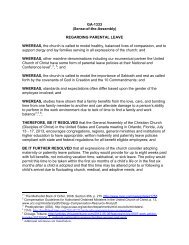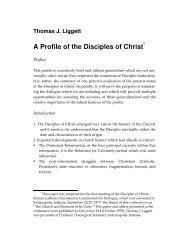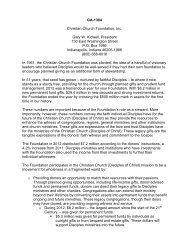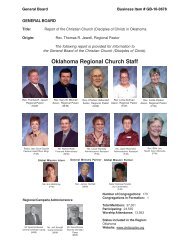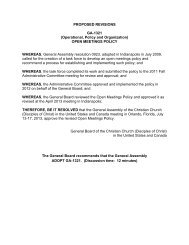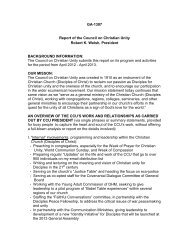RESOURCING THE CHURCH FOR ECUMENICAL MINISTRy A ...
RESOURCING THE CHURCH FOR ECUMENICAL MINISTRy A ...
RESOURCING THE CHURCH FOR ECUMENICAL MINISTRy A ...
You also want an ePaper? Increase the reach of your titles
YUMPU automatically turns print PDFs into web optimized ePapers that Google loves.
your mind? I certainly think of picketing, organizing<br />
advocacy networks, writing letters to decisionmakers<br />
and media, making phone calls, holding<br />
town halls perhaps, and so on. I wonder if we<br />
couldn’t use more of our God-given creativity to<br />
increase our menu of options. For instance, the<br />
congregation I serve is full of business leaders. (At<br />
board meetings I sometimes think we have too many<br />
of them!) What are ways we can include and<br />
encourage business leaders to be advocates and<br />
people of justice in their work lives? Too often those<br />
with resources are preached at or scolded. We<br />
perpetuate the “money is bad” fiction.<br />
I just accepted an invitation to speak on a panel this<br />
fall about how businesses can create positive social<br />
change. Over the last couple weeks, during my<br />
discussions about the panel with the organizers, at<br />
least two of their impressions have become clear:<br />
First, they perceive religious leaders as ignorant<br />
about the realities of social dilemmas, including<br />
poverty; second, they perceive us as those who talk a<br />
good game about social change, but rarely act to<br />
actually change anything at all—in society or in our<br />
churches. Whether or not we agree with these<br />
perceptions is secondary so as long the perceptions<br />
exist. And it certainly seems to be the case, from my<br />
view, that the most productive social change work<br />
right now is led by social entrepreneurs and<br />
philanthropists. Often they are doing the systemic<br />
change we are talking about. Now is the time for us<br />
to connect more deeply.<br />
I’ll just touch on this one: I’m not sure that<br />
Christian unity and church unity mean the same<br />
thing. In fact, I would argue that many people of<br />
faith—Christian and other faiths—are uniting<br />
precisely around issues of justice and prophetic<br />
witness. Many times this work happens independent<br />
of ecclesial structures. Are those structures<br />
slowing ecumenical progress? To ask it another way,<br />
is the unity and renewal of the church essential for<br />
its witness? Or, can the witness progress just fine,<br />
thank you very much, without being hampered by<br />
concerns of unity in any formalized sense? Who or<br />
what benefits from a more united church? When<br />
Jesus was asked about finding God’s kingdom, he<br />
suggested taking some action or changing some<br />
behavior. Never is it recorded that he said, “Form<br />
the right set of doctrines.” How, if at all, does this<br />
speak to us about unity and witness?<br />
I wonder if another communication hurdle we face<br />
is due to the difficulty of measuring effectiveness in<br />
Wilson • Christian Unity and Prophetic Witness<br />
36<br />
church life. Whether it’s the seminarians to whom I<br />
referred earlier, or congregational clergy, or<br />
judicatory leaders, or laity, I think part of our<br />
problem stems from the difficulty of proving that<br />
resources used on matters of furthering unity or<br />
witness are producing desired results. They might<br />
respond with that old joke about the man who went<br />
to his boss and said, “Boss, when’s that pay raise of<br />
mine going to be made effective?” Boss said, “As<br />
soon as you are.” Measuring things in the church is<br />
not easy, is it? Maybe that’s why we fall back on<br />
counting noses and nickels. At least those are two<br />
things we can count: what’s the attendance; what’s<br />
the offering? Surely we can brainstorm ways to<br />
prove the value of unity and witness.<br />
They perceive us as those who talk<br />
a good game about social change,<br />
but rarely act to actually change anything<br />
at all—in society or in our churches.<br />
I want to conclude with a problem I have. You don’t<br />
have enough time for many of my problems, so I’ll<br />
just name one. I’ll call it the “Mark” problem. Mark<br />
sang at the church I serve last fall. Mark’s special<br />
music was just after my message in the worship<br />
celebration, so he had no choice but to listen to the<br />
message! The following Thursday, Mark stopped by<br />
church just as I finished a class I teach about<br />
forgiveness. We didn’t have an appointment<br />
scheduled, so my assistant buzzed me to see how I<br />
wanted her to handle it. I decided to meet with<br />
Mark, so he came to my office and we talked. For the<br />
first 30 minutes, there was nothing terribly<br />
remarkable in our conversation. He asked some<br />
questions about our order of worship, about why we<br />
celebrate the Eucharist every week and about how we<br />
mix genres of music.<br />
Then he said, in what I first thought was his parting<br />
statement, “Well, I just wanted to stop by and say I<br />
thought your sermon was kind of, okay.” I laughed<br />
and said that’s what all of us preachers strive for:<br />
“Kind of okay” sermons! Immediately Mark<br />
launched into conversation with new vigor. He said<br />
that for him a “kind of okay” sermon was good. He<br />
said he never felt comfortable in a church, and that<br />
the only reason he sang in churches was to earn extra<br />
money with generally pretty minimal expectations.<br />
We talked about the openness of our congregation


